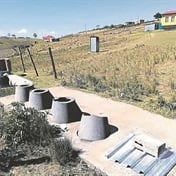
Control of the country’s biggest tender, the lottery operation, is set to pit Hosken Consolidated Investments (HCI), owners of free-to-air channel e.tv, and gambling power couple Eric and Charmaine Mabuza against each other this week.
At the centre of the battle, which is set down for hearing on Tuesday and Wednesday at the Johannesburg High Court, is the power to control the lottery which gives many South Africans some hope that one day they could become millionaires.
The fight could put in jeopardy playing the lottery and the distribution of funds which benefit charities and sports organisations, among other entities.
The battle for the control of the lottery’s operations began in 2016 when Ithuba repaid the R341 million loan, plus interest, that HCI had advanced when the government awarded Ithuba the tender for the lottery games for eight years.
The loan came with a hefty interest rate of 25% and strict repayment conditions.
At the time Ithuba could not get loans from banks because the award was being contested in court by Gidani, the previous operator.
Boosted by a July arbitration award which found that Ithuba had no right to repay the HCI loan quicker – HCI has now gone for the jugular demanding management oversight rights of the operations, which come with a 1% payment of all the games’ total sales.
HCI wants the court to bar Ithuba from paying its management consultants company, Zamani Marketing and Management Consultants, and its employees.
Ithuba now pays Zamani 4.67% of total sales – amounting to millions of rands – monthly for providing operational support and staff to Ithuba to effectively run the lottery.
HCI claims that this percentage was irregularly inflated by Ithuba and that Zamani, the group chief executive officer of which is Charmaine Mabuza, who is also chief executive of Ithuba, should be paid 3% for management services.
Instead, HCI demands that the money should be paid into a lawyer’s trust account.
Charmaine Mabuza has been a director of Wiphold, the first black female-owned company to list on the JSE, and she was the founder and former CEO of social grant distributor Empilweni Payout Services – which operated mostly in Mpumalanga.
The application is brought as an urgent matter which the Mabuzas are opposing, arguing the case is not urgent since the matters raised have been known by HCI as far back as 2015 when the loan was advanced.
The Mabuzas’ defence has also been boosted by the National Lotteries Commission (NLC), which has asked for intervention in the matter arguing that if the relief sought by HCI was granted, this “may compromise the National Lotteries Commission’s statutory responsibilities to ensure that the national lottery and sports pools are conducted with due propriety and strictly in accordance with the Constitution … that the interests of every participant in the national lottery are adequately protected; and the proceeds … are as large as possible”.
The arbitrators agreed that Ithuba’s repayment of the loan before time did not benefit HCI, which made the loan available at the time so that they could be rewarded for the eight-year duration of the lotto operation.
In court papers, Charmaine Mabuza hits back at HCI arguing that the gambling and hospitality giant HCI “has no entitlement to prevent Ithuba from paying a management fee of 4.67% to Zamani. Nor do the applicants have any entitlement to interdict payment of the management fee to protect the 1% fee to which HCI may, in the future, become entitled. Before HCI may become entitled to a 1% fee … a series of preconditions would have to be satisfied.”
Such preconditions include HCI receiving a merger approval from the competition authorities; consent from the minister of trade and industry and the NLC for the “step-in rights” and HCI should exercise its rights of oversight.
“HCI has no entitlement to be paid 1% administration fee by Zamani until such time as a merger approval is granted. Even if merger approval were to be granted, HCI would not be entitled to be paid the 1% administration fee for the period preceding the merger approval because that would amount to prior implementation of the merger,” she said.
Charmaine Mabuza said an interdict restraining Ithuba from paying salaries appeared to be directed at enforcing the arbitration award, which Ithuba and Zamani had already indicated they would oppose if it were to be made an order of the court.
She argued that Ithuba and Zamani would suffer massive prejudice if the court ordered that the management fee be paid to a law firm.
Zamani uses the management fee to pay its overheads and operational costs (which came in at R3.9 million in August) in relation to Ithuba.
A further R5.2 million of the management fee was used to pay Ithuba’s salary expenses.
“The relief sought makes no provision for these expenses. Indeed, the relief sought would constitute a breach or repudiation by HCI of the management agreement since its conduct threatens to interfere with Ithuba’s rights under the agreement to receive management services from Zamani, and threatens to prevent Zamani from performing its obligations,” Charmaine Mabuza said.
HCI has argued that its refusal of early repayment of the loan was because the “true charecterisation” of the funding it gave to Ithuba was that of an “investment in a project”.
“HCI does not look to make short-term investments ... HCI’s investments would run for a number of years, most probably for the entire duration of the licence,” it said in the arbitration hearing.
The step-in rights that HCI seeks to be confirmed by the court could see it take over the role of Zamani.
In August, when people protested outside HCI offices in Cape Town, the company said it was evident that those who were roped into the protest action had no clue about the funding arrangements.
 | ||||||||||||||||
Dumisane LubisiExecutive editor | City Press | ||||||||||||||||
| ||||||||||||||||
| Rise above the clutter | Choose your news | City Press in your inbox | ||||||||||||||||
| City Press is an agenda-setting South African news brand that publishes across platforms. Its flagship print edition is distributed on a Sunday. |
 | ||||||||||||||||||||||||||
Abram MashegoSenior journalist | City Press | ||||||||||||||||||||||||||
| ||||||||||||||||||||||||||
| Rise above the clutter | Choose your news | City Press in your inbox | ||||||||||||||||||||||||||
| City Press is an agenda-setting South African news brand that publishes across platforms. Its flagship print edition is distributed on a Sunday. |




 Publications
Publications
 Partners
Partners








